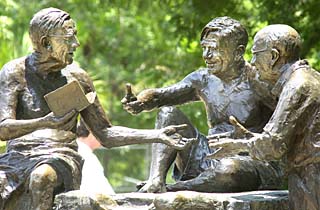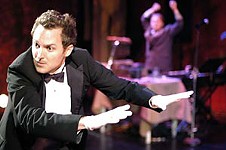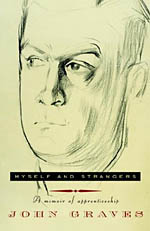Salon of the West
Dobie, Bedichek, and Webb: a friendship to stand the test of time
By Steve Moore, Fri., July 4, 2003

On any given evening in the 1940s or 1950s, an old man named J. Frank Dobie might walk over to the house of another old man named Roy Bedichek for a conversation and a little beer. To get there, he turns left from his front door at 702 Park Place (now East Dean Keeton), heads two long blocks east, and crests the hill at Red River. He can see the last of the after-work traffic sliding up East Avenue (already an artery, soon to be I-35). The sun falls behind him, and the evening light pulsing on the chrome is the signal of an unfamiliar code. He turns right and bears south for three blocks to 23rd Street, then takes a left and heads east two blocks to Oldham Road. Bedichek's house sits on the southeast corner of 23rd and Oldham; Dobie jaywalks the intersection, climbs the porch steps, and knocks. If it takes him more than eight minutes door-to-door, the night has been hot enough to move through slowly or he found a cat or a friend along the way.
I made the same walk last night, but Oldham Road was gone, and 23rd was gone, and Bedichek's house was the parking lot of the LBJ Library. The night was hot, but encountering no friends and no cats, I made it in 71é2 minutes -- including the pretend knocking on the pretend front door.
And then I was done -- and alone in a wide space. With my remaining seconds, I imagined the moment was part of a movie: The camera cranes up to show the parking lot, then the neighborhood and the new city, like a map, but with everything that's gone now shaded in with blue.
Dobie and Bedichek knew each other for 40 years. Together with Walter Prescott Webb, they comprised an intellectual triumvirate at the center of what their contemporaries sometimes called the Salon of the West. Webb, a historian, wrote the epic tale of the Great Plains. Dobie, a prolific folklorist and professional iconoclast, charmed and cussed and typed his way to the center of Texas popular writing -- such as it was at the time. Bedichek, the great and gentle naturalist, spent a life watching birds, telling stories, writing letters, and holding together a community of thoughtful men by the power of his personality.
Those are the standard designations for these once-famous Austinites -- one historian, one folklorist, one naturalist -- but it is truer to say that each of them had strains of historian, folklorist, iconoclast, naturalist, storyteller, and conversationalist, not to mention philosopher, crusader, and cowboy. Despite differences in personality and variations in discipline, their similar childhoods spun all three into the same kind of man. They were each raised in tiny Texas towns around the turn of the century, after the Indians had all been run off or killed. Each lived among hardscrabble farms, one-room schoolhouses, and contentious battles over the proliferation of barbed wire, an invention that all three loathed. They grew up outside, working hard and learning about trees and water, about snakes and horses, and about the people who'd lived on the land before them -- settlers, Indians, Spaniards, other Indians. And still young, they left their small towns for jobs as teachers and journalists, settling finally in the world of Austin academia at UT: Dobie and Webb as teachers, Bedichek as head of the University Interscholastic League, and all three as curious, enthusiastic, well-read, hard-working intellectuals.
And so they were friends. Like the best of friends, they became better at being themselves by mutual influence and encouragement and saved one another from boredom and despair. They were the acknowledged giants of Austin at a time when Austin was not so different from the rest of Texas: boring and desperate. Liberal-minded men with ability and learning rarely rolled suddenly out of the country -- a country notorious for its distrust of brainpower. Still, they all three loved that country and longed for it, for that frontier, which was disappearing even as they grew into men. (If the imagined map were large enough and old enough, of course all of Texas would be shaded blue.)
Despite their connection to that land, they could never belong there, and so they took refuge in Austin and in one another.
Under their influence, Austin made a major shift from typical Texas town into an oasis of open-mindedness. To the wider world they were writers acknowledged for their stories and their ideas, but here in Austin they were far more than that. They were real men. Here, they represented a spirit of deep and well-aged friendship and friendliness. They spent long, lazy days in conversation around the swimming hole, with one another or anyone else who might approach them. They offered and asked for camaraderie and got it and gave it to each other and everyone around them. They did their best to take care of the world.
But every friendship is particular, and the better it is, the more particular it gets. Just so, these three each offered something peculiar to one another. Dobie acknowledges his debt to Bedichek in the dedication to his book I'll Tell You a Tale:
To the memory of my cherished friend Roy Bedichek, a whole man of just proportions, a rare liver, in solitude as well as with genial companions; ample natured and rich in the stores of his ample mind; always understanding, whether agreeing or not; always enlarging both his own views and those of others. In talk he called forth all my powers, made me laugh, live more abundantly, love life with more reason.Their conversations were more than friendly banter. They were often a crucible to refine and distill ideas that Dobie funneled into his weekly newspaper column. By contrast with his books, which are nostalgic and apolitical, his newspaper column eloquently condemns fascism, blacklisting, censorship, when those things desperately needed condemning. The arguments Dobie made bear Bedichek's stamp of rigor, humor, and sympathy.
What Bedichek offered Webb was different. Webb was well on his way as a thinker and writer before meeting Bedichek, and so the influence seems to be more purely Bedichek's force of heart than his force of mind. Webb had a reputation as a quiet man, almost morose, even among most of his friends, but Bedichek could always open him up with his playfulness and curiosity. Webb liked best to have Bedichek to himself, camping out in the wilderness, exchanging thoughts and feelings that Webb had no other way to express. Bedichek endorsed and encouraged and understood Webb as no one else seemed able to do. It is a great testament to Bedichek that he had so many friends and took such particular care of them individually. And yet he had a reputation of being always the same, not bending himself to suit the people he encountered, but simply welcoming them freely into his roomy good humor and compassion.
From Dobie and Webb, Bedichek received -- besides their loyalty and admiration -- constant encouragement to record in some permanent form his innumerable stories and reflections about nature, which he finally did. He wrote his first book, Adventures With a Texas Naturalist, after Webb and Dobie all but locked him in a room to do it, taking a year for the task and finishing at the age of 68. He died suddenly 12 years later, having written three more books, though Adventures stands out as the best of the lot. Sixty-eight might seem like a late start, but Bedichek had actually been writing for years -- not books, but letters. He corresponded with friends and family almost maniacally for all of his adult life. His days began early at 4am with a few pages of Plato, followed by hours of reading and writing his letters. Though Bedichek's books are full of a hearty earnestness and reams of fascinating facts, the writing is ornate and rambling; in contrast, his letters are simple and clear, and at times they contain arresting confessions of doubt and of outrage, but most often they tell of his satisfactions and little surprises of discovery.
The letters tell us that Bedichek liked tomatoes (particularly his own), fresh milk, sleeping in sheets that sat in the sun all day on a lavender shrub, urinating and defecating out of doors, and cooking vegetables in the ash of a fire. He liked great empty spaces -- as documented in a wonderful PBS special, Roy Bedichek's Vanishing Frontier, which aired in April on KLRU -- and he liked to do things that took all day. The letters paint a picture of a whole and particular man. (If you're curious to read them, Bedichek's letters have been collected into two volumes -- Letters of Roy Bedichek, edited by William Owens and Lyman Grant, which deliberately omits any family letters, and The Roy Bedichek Family Letters, edited by his daughter-in-law Jane Gracy Bedichek).

You might suppose that living in the same town and seeing them almost daily would mean that Bedichek didn't write letters to Dobie or Webb -- or they to him. But in fact, Bedichek, Dobie, and Webb traded scads of letters. Usually they exchanged anecdotes, elaborated a point from some earlier conversation, or just told the day's news, but often they wrote letters from deep inside the mind, set to one side of daily life, as if to conduct a second friendship parallel to the first, but on secret terms. The letters carve out a wide space for poetic speculation about nature, injustice, old age, and death. Although a few fascinating audiotapes remain of the three in conversation, and although their other friends told many tales of them in writing, the letters stand as the best record of the men and their friendships.
They weren't perfect by any means. Readers of Webb's book The Texas Rangers often accuse him of playing apologist for racism and butchery -- and they're right. Dobie chased the spotlight, and in the end he became a cowboy cartoon of himself. And even Bedichek had strains of self-satisfaction and preachiness. In spite of these faults, their energy, intelligence, and integrity drew others into this so-called Salon of the West -- fellow professors, storytellers, journalists, and other New Dealers and civil libertarians like themselves.
Among the youngsters in their clan were John Henry Faulk and Ronnie Dugger. Faulk was Dobie's protégé, for whom Austin's downtown library branch is named. A writer and humorist famous for his nationally syndicated John Henry Faulk Show, on the radio from 1951 to 1957, Faulk's greater notoriety comes from his tenacious battle against the blacklisting of the Fifties. He tells the story of his ultimately victorious five-year court battle in Fear on Trial, dedicated "[t]o the three persons, Texans all, who influenced me the most in respecting the liberated mind and the joys and responsibilities of citizenship: My mother and father and J. Frank Dobie."
The other youngster, Ronnie Dugger, founded The Texas Observer in 1954 when he was 24 years old, and the magazine has served as an engine for intelligent and progressive analysis ever since. Throughout the Observer's first 10 years, articles by and about Dobie, Bedichek, and Webb appeared frequently, and at last Dugger collected the articles into a book called Three Men in Texas, an extended flattery by friends and admirers -- including the men themselves admiring one another.
The admiration has everything to do with the men and almost nothing to do with their writing. In truth, Dobie, Bedichek, and Webb earned their local fame more by who they were than by what they wrote. Dobie's books, like Bedichek's, are less compelling than one might hope, often consisting of related anecdotes loosely tied together. In his 1968 essay "Southwestern Literature?," Larry McMurtry convincingly demotes Dobie from literary giant to respectable scribe. Dobie's audience, he predicts, "will probably not outlive him much more than a generation." When McMurtry published the essay -- only four years after Dobie's death -- disciples leapt to Dobie's defense, but now, 40 years later, the disciples are mostly dead as well, and Dobie's books are fading from the shelves.
Bedichek fares better. McMurtry credits him as a "stylist" and says he "used language better than either of them." I disagree. Of the three, I think Webb's writing is the keenest and most readable. Even with subchapter titles like "Conservation of Soil Moisture" or "The Evolution of the Range and Ranch Cattle Industry, 1866 to 1928," his writing is confident, enticing, and propulsive.
It helped me get through the books to imagine Bedichek, Dobie, and Webb in person together, reading the books aloud to one another. I wanted to imagine their voices. They were famous above all for their conversations, which lit up back yards and campgrounds, car rides and restaurants -- in particular the Night Hawk at 20th and Guadalupe, now shaded in with blue on the imagined map (a Schlotzsky's). They talked about the things that were important to them: birds, grass, books, the weather, freedom of thought, and citizenship. In 1994, a group of Austin philanthropists commissioned a statue to celebrate those conversations, specifically those that took place on one particular rock at the Barton Springs Pool. In the statue, which sits outside the main entrance of the pool, Bedichek, Dobie, and Webb all in bronze gather around a bronze version of their old rock. The sculptor, Glenna Goodacre, called the statue "Philosophers' Rock," though the men themselves and the pool regulars in those days referred to that particular rock as Conversation Rock, or more commonly, Bedi's Rock. Bedichek's friend Wilson Hudson even wrote a little poem about it:
Bedichek sat on Bedichek's Rock,
The water was cold but Bedi was hot.
For 40 years, from July to October, Bedichek drove to the pool every afternoon at 3:30 to sit for two hours with his friends on that rock. It was part of a limestone outcropping just west of the diving board and just above Parthenia, the largest of the pool's springs. A small sycamore cast shade along the back of the rock for those who liked to stay cool. Bedichek didn't. He preferred the direct sun, and, when he got hot enough, he'd stand up and fall backward into the cold water as it rushed from the spring and let it drift him a little downstream.
The rock is gone now. After all three men had died, an epic flood washed it toward the Colorado. The Texas writer Don Graham says that flood came in the late Sixties, but he can't remember how he knows that, and no one else seems to know at all.
Bedichek was the first to go. He died suddenly in his home on May 21, 1959. Webb outlived him by four years, Dobie by 51é2. Earlier I tried speculating about what each man owed to the others, but never mentioned what Dobie owed to Webb or Webb to Dobie. In fact, they were never considered terribly close friends, though they spent much time in shared conversation with Bedichek. The topics ranged far and wide, but death was a common one, especially as they saw it coming for them. I try to imagine the conversations that Dobie and Webb might have had after the passing of their dear friend. Perhaps they met at Barton Springs to reminisce, struggling together through the gaping loss, and hoping to forge a new connection across his absence. (I imagine a dot that haunts the map, from house to house and down to Barton Springs and back, shaded with a deeper blue than what he moves among.)
We all know and remember some few things and forget the rest, and we remember best what is still present and alive. The books, though worth remembering, won't ever be widely read again; McMurtry was mostly right about them. But thanks to the statue, we can remember the vision that these men shared of the good life, a life spent with each other in a quiet and beautiful place -- thankfully still present and alive. What's difficult to remember, or even to believe, is that dead people whom we never knew were once actually there as well and that they splashed in the water and had voices and missed each other when they died.
Even with their flaws, they were good and worthy, continually fighting to understand the world, and brave enough to try to make it better. Maybe they were old men whose wives took care of them. Maybe they never escaped their childhood fascinations with the dying frontier -- and had to die with it. Maybe they weren't imaginative enough or smart enough, or maybe in 2003, we're just smart about other things, darker things, about irony, change, worry, and loneliness. They were smart about birds and the weather and what a person owes to another person, and what he owes to the general good.
Well, to each his own.
If you have time, read one of the books or read the letters. Remember the individual lives and their friendships with one another. Remember their fondness for Austin and Barton Springs, and their love of conversation and nature and liberty. Forget the walk from house to house. Forget the house. Forget the porch steps. Forget the porch. But remember that blue sound of someone in the evening, knocking on his friend's front door. ![]()
Steve Moore is a member of Austin's Physical Plant Theater and a playwriting fellow at the Michener Center for Writers. His play Nightswim, about Dobie, Bedichek, and Webb, premieres in April 2004 at the State Theater.








